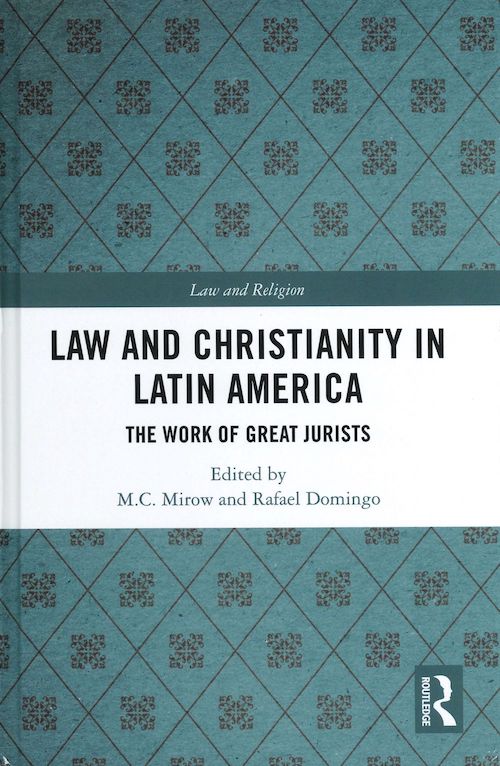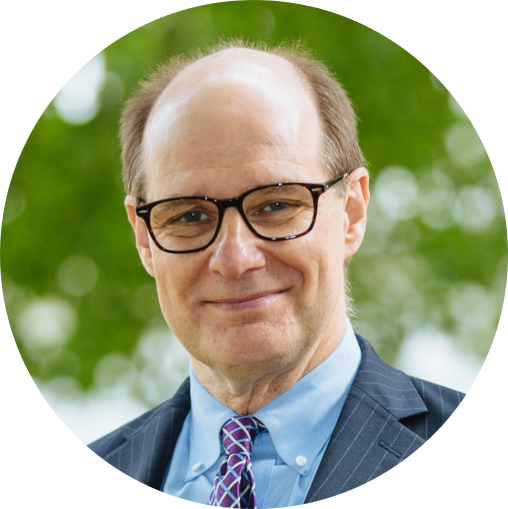
Law and Christianity in Latin America:
The Work of Great Jurists
edited by M.C. Mirow and Rafael Domingo
This volume is part of a fifty-volume series on “Great Christian Jurists in World History, “presenting the interaction of law and Christianity through the biographies of 1000 legal figures of the past two millennia. Commissioned by the Center for the Study of Law and Religion at Emory University, each volume in this series focuses on a specific country, region, or era, and it samples the life and work of a score or more of its greatest legal minds over the centuries. These legal minds include not only civil and canon lawyers and judges but also theologians, philosophers, and church leaders who contributed decisively to legal ideas and institutions, or who helped create landmark statutes, canons, or cases. Thus, familiar Christian jurists like Gratian, Grotius, Blackstone, Kuttner, and Scalia appear in this series, but so do Augustine, Isidore, Aquinas, Calvin, Barth, and Romero. This biographical approach is not intended to deprecate institutional, doctrinal, social, or intellectual histories of law and religion, nor will it devolve into a new form of hagiography or hero worship of dead white males. It is instead designed to offer a simple method and common heuristic to study the interaction of law and Christianity around the world over the past two millennia.
Columbia University Press opened this series in 2006 with a three-volume work on Modern Christian Teachings on Law, Politics, and Human Nature, featuring thirty modern Catholic, Protestant, and Orthodox Christian figures. Cambridge University Press has new titles on great Christian jurists in the first millennium, as well as in English, Spanish, French, Lowlands, and American history. Routledge is taking up the Italian, Nordic, Russian, Welsh, and Latin American stories; Mohr Siebeck the German story; Federation Press the Australian story. Forthcoming titles will cover great Christian jurists in the history of Scotland, Ireland, Austria, Switzerland, Greece, Poland and various countries and regions in Eastern Europe, central Eurasia the Middle East, Africa, and Asia.
Foreword by John Witte, Jr.
In an impressive series of writings over the past two decades, M. C. Mirow has brought Latin American law and legal history to brilliant light and life for the English-speaking world. His work ranges over five centuries — from the first Spanish colonial encounters with the New World to the latest legal and constitutional movements in the countries of the region. His works covers a 5000-mile-long land mass – from the southern tips of Chile and Argentina to the northern edges of the colonial Spanish North American empire in Florida, Louisiana, and New Mexico. And his work cuts across various types of Latin American law–public, private, penal, and procedural laws set out in customs, codes, conventions, and constitutions that together govern the 650 million people living in this vast region of the world. Particularly Professor Mirow’s signature titles Latin American Law: A History of Private Law and Institutions in Spanish America (Texas, 2004; 2009) and Latin American Constitutions: The Constitution of Cádiz and its Legacy in Spanish America (Cambridge, 2015) are standard English texts on Latin American law, which he presents in historical, comparative, biographical, and cultural perspectives. Important for this volume have been Mirow’s careful documentation of the pervasive influence of Catholic teachings on Latin American law and politics over the centuries, and his call for legal historians to focus on the “neglected factor” of “individual experience in legal change.”
Over the past three decades, Spanish legal historian and jurist, Rafael Domingo has brilliantly opened and integrated the worlds of ancient Roman law, Christian canon law, and modern civil law, which he has been drawing into a robust new theory of global law and religion. Professor Domingo has published more than 100 articles and 25 books, including signature recent titles on The New Global Law (Cambridge, 2010), God and the Secular Legal System (Cambridge, 2016), Great Christian Jurists in Spanish History (Cambridge, 2016), Roman Law (Routledge, 2018), Great Christian Jurists in French History (Cambridge, 2019), Christianity and Global Law (Routledge, 2020), and Law and the Christian Tradition in Italy (Routledge, 2020). He, too, has been working hard to build new legal, cultural and religious bridges between Spain and its Latin American progeny, between the modern Anglo-American common law world and the Latin American civil law world, and between Catholics and Protestants as well as European and Indigenous traditions in Latin America. Significantly, Domingo has published more than 200 op-eds in Spanish and Latin American newspapers and has been interviewed more than 40 times on CNN/Spanish edition on cardinal law and religion themes.

In this volume, these two great scholars have combined their talents and toolboxes to tell the story of law and Christianity in Latin America. While alert to earlier colonial times when Spanish and Portuguese law and religion dominated this region, the editors have focused their study on the nineteenth and twentieth centuries when independent nations on that long continent were born and flourished. While taking note of a wide range of factors that have shaped the development of Latin American law, they tell this story through a series of thirty-seven biographical case studies commissioned from three dozen leading scholars in and on Latin America.
The chapters range from Juan Germán Roscio, a central figure in Venezuelan independence, to Carlos Alberto Menezes Direito, a prolific Brazilian jurist who strove to bring religious perspectives to bear on public life and law. Between these two bookends, readers learn about the lives and legal contributions of such codifiers as Andrés Bello, father of the Civil Code of the Republic of Chile. They encounter legal visionaries of the emergent modern Latin America, like Augusto Teixeira de Freitas, drafter of the Brazilian Esboço de Código Civil and Dalmacio Vélez Sarsfield, drafter of the Argentinian Civil Code. Included as well are compelling studies of pacific revolutionaries like the Cuban priest Félix Varela; peace negotiators like José Bernardo Couto y Pérez; and the great Catholic martyr of social justice reform, Archbishop Oscar Romero. Other chapters introduce hitherto neglected legal scholars across the Continent who helped with nation building and legal development in their home countries.
Two important legal movements dominated the development of modern Latin American law: constitutionalism and codification. Early constitutions were modeled in part on the French and United States Constitutions. These new Latin American constitutions formally eradicated traditional aristocratic privileges and institutions as well as the hierarchical categorization of persons into Indians, priests, merchants, and others. In their place, the constitutions formally enacted new legal systems, executive and legislative political bodies, and independent courts based on the principles of equal citizenship under the law and separation of powers. Despite these lofty constitutional aspirations, however, inequality, illegality, and political corruption have intermittently plagued the region.
Many modern Latin American countries adopted and adapted French civil, commercial, penal, civil procedural, and criminal procedural codes, and their concomitant principles of economic liberalism and legal positivism. Other European codes, too, born in part of Enlightenment liberalism and German historical jurisprudence had an influence, including notably the Prussian Civil Code and the Bavarian Penal Code. Many later Latin American countries looked for legal inspiration from their neighbors, too, rather than from across the Atlantic. For example, the Chilean Civil Code of 1855 by Andrés Bello, and the Argentine Civil Code of 1870 by Dalmacio Vélez Sársfield were highly influential in many other countries of Latin America and the Caribbean. So was the Esboço de Código Civil, the Brazilian draft civil code of 1865 by Augusto Teixeira de Freitas.
Latin America was founded not only as a set of Spanish and Portuguese colonies that eventually became nations, but also as a powerful new set of ecclesiastical provinces of the Roman Catholic Church that have remained formally in place to this day. The Catholic Church, however, has changed dramatically over the five centuries, including in Latin America, which has been an important laboratory for such experimental movements as liberation theology and an important advocate for the changes eventually enacted by the Second Vatican Council of 1962-1965. Particularly these latter reform ideas rendered the Church a critical actor in the process of legitimation and formation of the new nations, new political orders, and new legal systems, while remaining a fundamental institution of education, social welfare, and peace building in the region. Especially after the reforms of the Second Vatican Council, the Church also became a powerful advocate of religious freedom and human rights.
Throughout Latin American history, the Church’s influence was not only direct and institutional, but also indirect in shaping the culture, education, and values of the legal and political leaders and the people. And that influence can be seen poignantly in the lives and work of almost every one of three dozen figures featured herein. These were men of both faith and law, whose legal and political work was an expression and embodiment of a pervasively Catholic world view. These Christian values have continued to influence Latin American legal systems and actors, even though most of the modern secular legal documents no longer contain specific references to Christian sources or teachings.
Over the past half century, the law, culture, and religion of the United States has also had a strong influence in Latin America. Notably influential have been the legal realist movement in American legal education; the growing interdisciplinary study of law and society, law and economics, and law and religion; and strong new constitutional and cultural perspectives on free trade, contractual freedom, social equality, human rights, freedom of speech, and religious freedom for all. Particularly these latter constitutional freedoms have transformed Latin America into a new mission field for American Protestant missionaries who have established large numbers of new churches in the region.
Latin America has to face many serious challenges in the twenty-first century: failure of national governance, institutional corruption, drug and sex trafficking, profound social instability and persistent inequality, poverty, violence, environmental exploitation, unemployment, and uncertainty in millions of families are some of them. These new forms of pathos have added further wounds to a region still struggling to come to terms with ancient and deep scars produced by the Spanish conquest and Inquisition, the genocide of Indigenous peoples, and the active participation of the region in the trans-Atlantic slave trade well into the nineteenth century. At this fundamental level, Christianity and other faiths can and must continue to offer comfort and healing, restitution and reconciliation as well as continued reforms of the law on the books and the law in action.♦

John Witte, Jr., JD (Harvard); Dr. Theol. h.c. (Heidelberg), is Robert W. Woodruff Professor of Law, McDonald Distinguished Professor of Religion, and director of the Center for the Study of Law and Religion at Emory University. A specialist in Legal History, Human Rights, Religious Freedom, Marriage and Family Law, Law and Religion, he has published 280 articles, 17 journal symposia, and 35 books.
Recommended Citation
Witte Jr., John. “Foreword to ‘Law and Christianity in Latin America: The Work of Great Jurists’” Canopy Forum, August 20, 2020. https://canopyforum.org/2020/08/20/law-and-christianity-in-latin-america-the-work-of-great-jurists/

